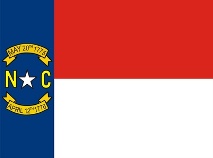 The Tar Heel State follows the Financial Responsibility law which went into effect in 1957; this law requires motorists to maintain a liability policy at all times during the registration period of a vehicle. The state takes this requirement very seriously with the full intention of protecting NC residents and motorists; the Financial Responsibility Act of 1957 was designed to ensure that compensation is in place for property losses and personal injuries for victims resulting from a traffic accident. These laws are strictly enforced and auto insurance companies are required to notify the Department of Motor Vehicles of any lapse in coverage; this can result in a the suspension of vehicle registration and a civil fine of $50, $100 or $150.
The Tar Heel State follows the Financial Responsibility law which went into effect in 1957; this law requires motorists to maintain a liability policy at all times during the registration period of a vehicle. The state takes this requirement very seriously with the full intention of protecting NC residents and motorists; the Financial Responsibility Act of 1957 was designed to ensure that compensation is in place for property losses and personal injuries for victims resulting from a traffic accident. These laws are strictly enforced and auto insurance companies are required to notify the Department of Motor Vehicles of any lapse in coverage; this can result in a the suspension of vehicle registration and a civil fine of $50, $100 or $150.
The most common method chosen by residents to comply with the financial responsibility act is to purchase a North Carolina car insurance policy; the law requires that motorists carry a minimum coverage consisting of bodily injury liability of $30,000 for injury to one person, $60,000 per accident and liability in the amount of $25,000 for property damage. In addition, as of January 1, 2009, the state requires motorists to also carry Uninsured Motorist and Underinsured Motorist (UM/UIM) equaling the highest amount of bodily injury limits stated on the insured’s policy.
Obtaining automobile coverage can be done quite easily in a number of ways, but one should take proper measures to ensure that the right policy is purchased at a fair price. First and foremost, motorists must make sure that they purchase at least the minimum requirements mandated by the state; as mentioned, failure to maintain these limits can result in fines and the suspension of vehicle registration.
When shopping for coverage it is a good idea to use the numerous resources that consumers have available to them to make sure that the proper protection is acquired. Motorists have three avenues which can be utilized to help them determine the right type of policy necessary; they can call agents and discuss their situation to get advice on the coverage that is suggested by a professional, visit offices and do the same, or take it upon themselves and use the Internet to educate themselves on the different types of coverage and determine what will benefit them.
While speaking to a professional or agent may be helpful, it may be wise for consumers to utilize the Internet to get a better understanding of their options. A resident’s best bet is to visit the state’s website which provides helpful tips and educational material to help consumers become properly insured. The North Carolina Consumer Guide to Automobile Insurance is a great resource for residents and provides extensive information on vehicle coverage and most importantly is provided from a reputable source. Knowledge is key and the most effective way for a motorist to ensure that they are properly insured is to take a little bit of time to understand policies before making a purchase.